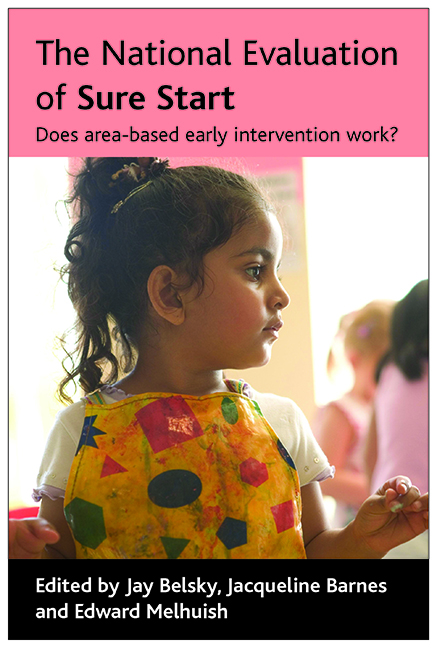Book contents
- Frontmatter
- Contents
- List of tables and figures
- Foreword
- List of abbreviations
- Notes on contributors
- Part One The historical and policy context
- Part Two The local context of Sure Start Local Programmes
- Part Three The implementation of Sure Start Local Programmes
- Part Four The impact of Sure Start Local Programmes
- Part Five Conclusion
- Index
six - Living with Sure Start: human experience of an early intervention programme
Published online by Cambridge University Press: 15 September 2022
- Frontmatter
- Contents
- List of tables and figures
- Foreword
- List of abbreviations
- Notes on contributors
- Part One The historical and policy context
- Part Two The local context of Sure Start Local Programmes
- Part Three The implementation of Sure Start Local Programmes
- Part Four The impact of Sure Start Local Programmes
- Part Five Conclusion
- Index
Summary
Policy context
The introduction of Sure Start Local Programmes (SSLPs) in 1999 presented a significant shift in the way family life with very young children was regarded by central government in the UK. Hitherto this had been largely a private space in which intervention was not a normal occurrence unless some crisis of health, child protection or family failure had occurred. The SSLP approach, however, was to be universal, proactive and preventative, to change the way service providers and others worked with families and the way parents in deprived communities reared young children.
The intervention also reflected a general shift in conceptual models underpinning policy reforms in the US and UK. An ecological approach to understanding child, parent, family and community functioning had been influential. For example, Bronfenbrenner's (1979; Bronfenbrenner and Ceci, 1994) model of child development emphasised the historical/cultural influences on children's experiences of services and the psychological and structural factors shaping their parents’ experiences. Belsky and Vondra (1989, p 157) described these influences and factors as:
multiple pathways by which individual (parental personality or child characteristic), historical (parental development history) and social (marital satisfaction and social network support) as well as circumstantial factors (poverty, job dissatisfaction, ignorance about child development) combine to shape parental functioning.
At the community level, parenting, particularly of the first child, is regarded as a time of acknowledgement of position in the community. For young parents, producing children ensures the future of the community, and is highly valued (Benedict et al, 1989). Investment in the health and well-being of young children, particularly those seen as likely to be ‘expensive’ to the state, not only improves the child's life chances, but contributes to social regeneration. It may arrest the chain of adverse effects between poverty/social exclusion and poor life chances. Thus, SSLPs were to initiate a process that would gather momentum to improve the trajectories of whole communities in the long term (Oliver and Smith, 2000).
No reference was made to Sure Start in the 1997 Labour Party Manifesto. The initiative came direct from the Treasury and was unlike public policy generated in response to the demands of the electorate (see Chapter One).
- Type
- Chapter
- Information
- The National Evaluation of Sure StartDoes Area-Based Early Intervention Work?, pp. 97 - 112Publisher: Bristol University PressPrint publication year: 2007

